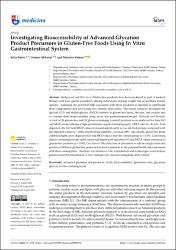Investigating bioaccessibility of advanced glycation product precursors in gluten-free foods using in vitro gastrointestinal system
Citation
Serin, Y.; Akbulut, G.; Yaman, M. Investigating Bioaccessibility of Advanced Glycation Product Precursors in Gluten-Free Foods Using In Vitro Gastrointestinal System. Medicina 2023.Abstract
Background and Objectives: Gluten-free products have been produced as part of medical
therapy and have gained popularity among individuals seeking weight loss or healthier dietary
options. Assessing the potential risks associated with these products is essential in optimizing
their compositions and developing new dietetic approaches. This study aimed to determine the
glyoxal (GO) and methylglyoxal (MGO) contents in gluten-free bread, biscuits, and cookies and
to examine their bioaccessibility using an in vitro gastrointestinal model. Materials and Methods:
A total of 26 gluten-free and 19 gluten-containing (control) products were analyzed for their GO
and MGO levels utilizing a high-performance liquid chromatography (HPLC) device. Results: Post digestion, the GO and MGO values increased significantly across all food groups compared with
pre-digestion values (p < 0.05), and the bioaccessibility exceeded 100%. Specifically, gluten-free bread
exhibited higher post-digestion GO and MGO values than the control group (p < 0.05). Conversely,
gluten-containing biscuits and cookies had higher post-digestion GO and MGO values compared to
gluten-free products (p < 0.05). Conclusions: The detection of precursors to advanced glycation end
products (AGEs) in gluten-free products has drawn attention to the potential health risks associated
with their consumption. Therefore, reevaluation of the formulations and technologies used in these
products and the introduction of new strategies are crucial in mitigating AGE content.
Source
MedicinaURI
https://www.mdpi.com/1648-9144/59/9/1578https://doi.org/10.3390/medicina59091578
https://hdl.handle.net/20.500.12780/681


















